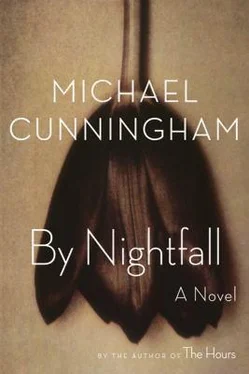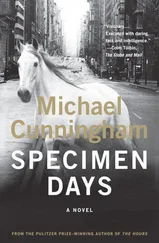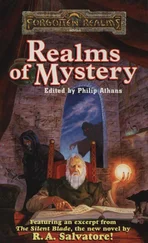Peter waits beside Rebecca on the bed as the phone rings up in Boston. Forgive me for hoping she isn’t home, for wanting to just leave a message.
“Hello, darling,” Rebecca says.
“Mm-hm. Yes, we’re fine. Ethan’s here. Yes, Mizzy. I know, it’s been years since you saw him. What are you doing?”
“Right. Sure. I guess they’ll give you better nights when you’ve been there longer, don’t you think?”
“Mm-hm. Mm-hm. Well, don’t panic, you know your obsessive mother is always good for a few bucks if you’ll deign to take them.”
Apparently, Bea laughs on the other end. Rebecca laughs in response.
Bea, love of my goddamned life. How did you get to be a sad, lonely girl working at a hotel bar in Boston, wearing a red jacket, making martinis for tourists and conventioneers? Did we commit our first mistake in utero, was the name Beatrice too much for you to bear? Why did you leave school to take a job like this? If I drove you there, I’m sorry with my whole heart. With whatever’s left of my heart. I loved you. I love you. I have no idea how or when I fucked it up. If I were a better person, I suppose I’d know.
Rebecca says, dutifully, “How’s Claire?”
Claire is the roommate, a girl with an armload of tattoos and no discernible occupation.
“Sorry to hear that,” Rebecca says. “I guess April really is the cruelest month. I’m going to put your father on, okay?”
She hands him the phone. What can he do but accept it?
“Hey, Bea,” he says.
“Hi.”
This is how she’s been with him lately. She’s gone from open resentment to bland friendliness, like a stewardess talking to a needy passenger. It’s worse.
“What’s up?”
“Nothing, really. Staying in tonight.”
There is a spiky blossoming in his chest. He’s seen this girl’s soul, he’s seen the tiny flickering essence of her when she was brand new. He’s seen her driven to paroxysms of delight by snow, by the neighbors’ stinky Lhasa apso, by a pair of red rubber sandals. He’s consoled her over uncountable injuries, disappointments, expired pets. The fact that they are now slightly awkward acquaintances, making small talk, means the world is too strange and mysterious, too dreadful, for his own minor heart.
“Well, that’s what we’re doing, too. Of course, we’re elderly.”
Silence. Okay.
“We love you,” Peter says helplessly.
“Thanks. Bye.”
She clicks off. Peter continues to hold the phone in his hand.
Rebecca says, “It’s a phase. Really.”
“Uh-huh.”
“She has to separate from you. You shouldn’t take it so personally.”
“I’m getting worried about her. I mean, worried worried.”
“I know. I am too, a little.”
“What should we do?”
“Let her be, I think. For now, anyway. Call her every Sunday.”
Gently, Rebecca takes the phone out of Peter’s hand, puts it back on the night table.
She says, “We seem to be a halfway house for confused children, don’t we?”
Oh.
The idea arrives suddenly—Rebecca prefers Mizzy. Mizzy has had the good sense to be elusive, and charming, and repentant, and (say it) beautiful. Rebecca and Peter did their best with Bea but she’d arrived so early (yes, there had been talk of an abortion, has Rebecca ever forgiven him for pressuring her?), and almost as if Bea sensed that she was not quite wanted, she was always prone to wounded solitude, to the sporadic little-girl tantrums that were replaced, during adolescence, by peevishness and outright rancor, by long condescending diatribes about the plight of the poor and the crimes of America, made extra strange by the fact that Peter and Rebecca gave to charities, and agreed with all but Bea’s most paranoid convictions, about AIDS as a government experiment, about secret prisons into which she herself might disappear some day, because she was so vocal about the conspiracies we were meant to ignore.
How did that happen? It seems that at one moment she was a child squealing ecstatically in his arms, and the next she was a tough, sharp-faced girl with machete and pistol, come down from her village to confront him with his crimes. He was indifferent to the needs of her people, he grew fat at their expense, his glasses were pretentious, he forgot to pick up her dress at the cleaner’s.
It seems that he missed a step. He’d been innocent and then, mysteriously, had found himself in Kafka-land, where the only questions were concerned with determining the extent of his wrongdoing, and the damages sustained.
Peter turns to Rebecca, almost says something, but thinks better of it. Instead he kisses her and settles in for sleep, knowing she’ll read for a while, glad about that, happy in a funny, childish way to be going to sleep as his wife—his perfectly cordial, increasingly remote wife—keeps her little bedside lamp lit, and turns her pages.
Monday, a little before ten. Uta is at the gallery already—you can’t get there earlier than she does. “Morning, Peter,” she calls from the back, in her exaggerated German accent. Mawning, Pedder. She’s been in the States more than fifteen years now, but her accent has gotten heavier. Uta is a member of what seems to be a growing body of defiantly unassimilated expatriates. She on one hand disdains her country of origin ( Darling, the word “lugubrious” comes to mind ) but on the other seems to grow more German (more not-American ) with every passing year.
Peter walks through the gallery proper—goodbye, Vincents. The crew is on its way to pack them up. Even after fifteen years, show after show after show, there’s a small sense of disappointment, a hint of actual defeat, when it’s time to bring it all down. It’s not about sales (though the Vincents did not, in fact, move the way he’d hoped they might). It’s some idea (other dealers will confess to it, too, some of them, after a few drinks) that with this show or that you might have moved something a fraction of a centimeter forward. Aesthetics? Art history? Ugh. But still. What about… the unending effort to find a balance between sentiment and irony, between beauty and rigor, and in so doing open a crack in the substance of the world through which mortal truth might shine?
Right. They’re objects, hanging on a wall. They’re for sale. They are also quite beautiful, in their way—canvases and sculptures wrapped in brown paper and bound with string and then coated in paraffin, vague reference to the shrouded Christ, made by a kind and rather feckless young man named Bock Vincent, three years out of Bard, who lives with his much older girlfriend in Rhinebeck and who is able, in a somewhat limited way, to talk about wrappings and bindings and their relationship to holiness; about how the art we anticipate is always superior to the art we can create. He insists there are images and objects under the wrappings, earnest attempts, though he won’t show or describe them, and the paper has been too thoroughly waxed to permit any kind of unveiling.
Anyhow, they’re coming down today. By Thursday, all new work.
Uta emerges from her office, coffee mug in hand. Hennaed nest of hair, heavy-framed Alain Mikli glasses. There had been an air of charged possibility between them for a while, a couple of years ago, when Rebecca was in the throes of her crush on the photographer from L.A. It was the time, if ever there were such a time, for Peter to have a little something going on—Rebecca seemed to want him to. Uta was clearly willing, and it seemed that she’d prefer it as a fling (terrible word), a final tipping-over after all the working together, traveling together, living Mondays through Saturdays in that semi-erotic almost-but-not-quite realm of physical proximity. She’d have been sexy and tough and affectionate, no question; she’d have been offended by the suggestion that she might expect more ( Zo, you tink vimmen only fock you to zee vat dey can get for it? ). And yet. Maybe Peter felt he could see it all too clearly: the wised-up, Weimar cynicism, a sweet and weary cynicism, but still; the cigarettes and coffee and banter; the whole bitterly humorous nihilistic German -ness of it. Because Uta is German, utterly German, which of course is probably why she left there, and insists that she’ll never go back.
Читать дальше
Конец ознакомительного отрывка
Купить книгу












